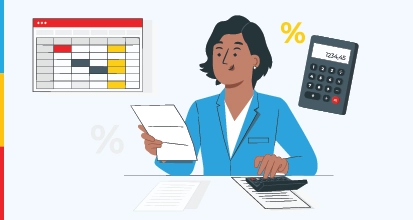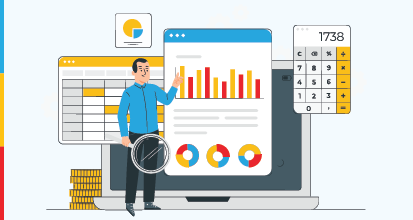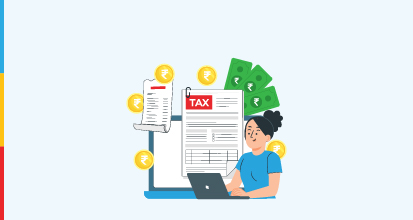Income Tax in India
India follows a progressive taxation system, which means higher-income earners are subject to higher tax rates. Taxpayers must file their income tax returns annually, declaring their earnings and claiming any eligible deductions or exemptions. Non-compliance with tax laws can result in penalties, legal action, or even imprisonment.
Income Tax Slabs Explained for FY 2024-25
Income tax slabs define the tax rates applicable to different income brackets. These slabs are periodically revised by the government to account for inflation, economic conditions, and fiscal policies.
For the financial year (FY) 2024-25, taxpayers can opt for either the old tax regime, which allows for various deductions and exemptions, or the new tax regime, which offers lower tax rates but limits deductions.
Here is an overview of the tax slabs under both regimes:
Old Tax Regime (with deductions and exemptions)
| Income Slab (₹) | Tax Rate |
|---|
Up to 2,50,000
| Nil
|
2,50,001 - 5,00,000
| 5%
|
5,00,001 - 10,00,000
| 20%
|
Above 10,00,000
| 30%
|
Taxpayers opting for the old regime can claim deductions under Section 80C (for investments like PPF, EPF, and life insurance), Section 80D (health insurance), and other exemptions such as House Rent Allowance (HRA) and Leave Travel Allowance (LTA).
New Tax Regime (without deductions and exemptions)
| Income Slab (₹) | Tax Rate |
|---|
Up to 4,00,000
| Nil
|
4,00,001 – 8,00,000
| 5%
|
8,00,001 – 12,00,000
| 10%
|
12,00,001 – 16,00,000
| 15%
|
16,00,001 – 20,00,000
| 20%
|
20,00,001 – 24,00,000
| 25%
|
Above 24,00,000
| 30%
|
The new tax regime offers simplified taxation but restricts deductions. It is beneficial for individuals with fewer financial investments in tax-saving instruments.
Tax Deducted at Source (TDS) – Old vs New Regime
Tax Deducted at Source (TDS) is a system where tax is deducted at the point of income generation rather than at the time of filing returns. It ensures that tax collection is spread throughout the financial year. Employers, banks, and other entities deduct TDS before disbursing salaries, interest, rent, or professional fees.
Under both tax regimes, TDS is applicable, but the key differences lie in how deductions and exemptions are treated.
Old Regime: Higher TDS deductions may be offset through exemptions and deductions when filing tax returns. Refunds can be claimed if excess TDS is deducted.
New Regime: Since deductions are limited, taxpayers may not have the option to reclaim significant TDS amounts unless there is an overpayment.
TDS rates vary depending on the income type and recipient category. Common TDS rates include:
- 10% on fixed deposit interest exceeding ₹40,000 (₹50,000 for senior citizens)
- 10% on rental income above ₹2,40,000 per annum
- 1% on property transactions above ₹50 lakh
Taxpayers must ensure that they provide their Permanent Account Number (PAN) to avoid higher TDS deductions. If TDS has been deducted in excess, individuals can claim a refund when filing their annual tax return.
Penalties for Tax Evasion
Tax evasion refers to deliberately avoiding tax payments through fraudulent means such as underreporting income, inflating deductions, or failing to file tax returns. The Indian government has stringent laws to curb tax evasion, and offenders can face severe consequences.
Some key penalties for tax evasion include:
- Underreporting of Income: A penalty of 50% to 200% of the tax due may be imposed
- Failure to File Tax Returns: A fine of up to ₹10,000 can be levied under Section 234F
- Failure to Pay Advance Tax: Interest at 1% per month under Section 234B may apply if 90% of the tax is not paid before 31st March
- False Statements or Wilful Concealment of Income: May lead to prosecution and imprisonment ranging from 3 months to 7 years, along with fines
- Late or Non-Payment of TDS: Employers or deductors failing to deposit TDS on time may face interest penalties and prosecution under Section 271C
To avoid penalties, taxpayers should:
- File income tax returns before the due date (typically 31st July for individuals)
- Ensure correct tax calculations and claim only eligible deductions
- Maintain accurate financial records and report all sources of income
- Regularly check Form 26AS (tax credit statement) to ensure correct TDS deductions
- Strict enforcement measures, including the linking of PAN and Aadhaar, digital tracking, and increased scrutiny by the Income Tax Department, have significantly reduced tax evasion cases in India











